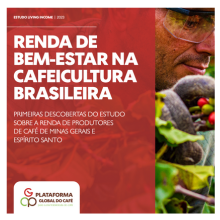
GCP Publishes initial findings on Living Income in Brazilian Coffee Production
GCP Brazil has launched the Living Income in Brazilian Coffee Production report as part of the GCP Collective Action Initiative on Social Well-Being. The publication follows two GCP Member-exclusive webinars. The study was able to show that growers of all sizes and regions (of the population analyzed) were able to reach a living income from coffee growing.
The findings show that once growers have access to an enabling environment (technical assistance, technology, credit, growers’ organization, logistics and market access) they are able to earn a living income. These conclusions however cannot be extrapolated to all coffee growers in Brazil, as the study concentrated in a specific population in the main producing coffee regions. A very interesting result of the study is the impact of diversification. For most types of grower income diversification (beyond coffee) was important or essential to reach the living income, and not only coming from other crops but also from services (such as machinery rental and others). Growers below 5 ha could only reach the living income by the contribution of income diversification.
Another important lesson is the impact of climate severities on growers reaching the living income and for this reason GCP Brazil is using the findings to build its GCP 2.0 Country Plan on Farmer Prosperity, aligned with the global GCP 2030 Goal and Strategy, and to focus on increasing climate resilience, incorporating sustainable regenerative agriculture practices among growers to decrease the impact of climate change. GCP Brazil is also using the study findings to address the enabling environment in regions where it is not yet developed or where it does not reach most growers.
GCP Collective Action continues globally
Another important lesson is the impact of climate severities on growers reaching the living income and for this reason GCP Brazil is using the findings to build its GCP 2.0 Country Plan on Farmer Prosperity, aligned with the global GCP 2030 Goal and Strategy, and to focus on increasing climate resilience, incorporating sustainable regenerative agriculture practices among growers to decrease the impact of climate change. GCP Brazil is also using the study findings to address the enabling environment in regions where it is not yet developed or where it does not reach most growers.
Other GCP affiliated Country Platforms in Latin America, Africa and Asia are also conducting similar studies that use the same methodology used in this Living Income Report in order for them to be comparable. The results will also be used to guide the development of their respective strategic plans.
This Living Income report is the first step to understand coffee growers’ income in Brazil. It is based on the Ankers methodology (benchmarks for living costs) with the addition of an unpprecidented field research conducted in Brazil with Arabica and Robusta growers of different sizes from key producing regions in Minas Gerais and Espírito Santo in 2022 (regarding the 2020 and 2021 crops).
We would like to thank all the GCP Collective Action Initiative partners, funders and implementers that were key in the development of this report. We believe it is a great source of information to guide development plans for the coffee sector – including public policies and private initiatives.

Go to the report now | Acesse o estudo aqui
This study was enabled through the Global Coffee Platform Collective Action Initiative on Social Well-Being, coordinated by the Global Coffee Platform (GCP) in Brazil, together with Cecafé (Brazilian Coffee Exporters Council) and InPACTO (National Pact for the Eradication of Slave Work Institute). We would like to thank Stephanie Daniels and Michelle Bhattacharyya, as well as The Sustainable Food Lab, for the support during the development of this research.
GCP Collective Action Initiatives are pre-competitive to bring learnings and results back to the sector in order to learn, scale and replicate, making input resources more effective. Please be encouraged and invited to join this initiative and contribute to its success.
Learn more about GCP Collective Action Initiatives in Brazil and globally
Start the conversation by getting in touch with our team:



